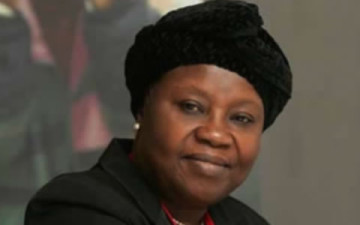
January 13, 2015
/
By:
ofcounsel_admin/
- 0 Comments
/
- Law News
NOW that Aloma Mukhtar CJN, has retired from active service, it is imperative to make a critical assessment of her tenure with a view to seeing how she fared. This will be done against the background of the fact that she came into office at a time when the image of the judiciary was at a very low ebb. This in turn was consequent upon the many controversies in which the judiciary found itself.
As somebody who has been monitoring developments in the judiciary with very keen interest, I can testify that one area the CJN is passionate about is to instill discipline in judges. This is because she apparently believes and rightly too that once there is discipline in the system most of the challenges confronting the judiciary would have been taken care of. These challenges include indolence which is a major cause of delay in the administration of justice. Others include bribery and corruption among others.
One of Justice Mukhtar’s first observations upon assumption of office was that many Judges traveled too frequently there by abandoning the jobs for which they are being paid. To curb this ugly trend the CJN directed that no Judge in Nigeria should travel out of the country without clearance from her office.
I am not in a position to know the extent to which this directive has gone in curbing indolence and indiscipline among judges as I am not an insider in the judiciary. One thing I know, however is that it is a policy that should be vigorously sustained by her successor in office. This is because the policy coupled with other measures already put in place will make Judges to sit down and do their work.
In her determined bid to sanitize the judiciary and redeem its image, Justice Mukhtar descended ruthlessly on some Judges for allegedly violating the code of conduct for judicial officers. I have no doubt whatsoever in my mind that she acted out of her personal conviction that these Judges deserved to be punished. The fact that she meant well is therefore beyond question. My position however has always been that Justice Mukhtar and indeed other members of the NJC are human beings. They cannot therefore be infallible.
Let us take the case of Hon. Justice Mohammed Talba of the FCT Judiciary as an example. This Judge was suspended by the NJC for one year without pay. His offence was that he sentenced a convict (John Yesufu accused of stealing pension fund to the tune of N32b Thirty two billion naira) to two years imprisonment or a fine of N750,000 (Seven hundred and fifty thousand naira). Justice Talba’s suspension followed the unprecedented public outcry that greeted this conviction. The public outcry was consequent upon the fact that many people saw the sentence as being too light for a man who stole such a staggering sum of money.
In an article serialized in the Guardian between 12th to 25th June 2013 (titled NJC vs Honourable Justice Muhammed Talba: Matters Arising) I decried the action of the NJC and argued that while it is desirable to discipline erring judges, the NJC must, in doing this avoid playing to the gallery. This is because the judiciary could be unwittingly humiliated in the process. As I observed in my article under reference, the EFCC charged the accused under Section 309 of the Penal Code which stipulates two years imprisonment for criminal misappropriation or an option of fine. In sentencing the accused therefore the Judge only acted within the Law. Surprisingly he was made a sacrificial lamb. It was for this reason that I saw the action of the NJC as playing to the gallery.
I repeated this humble advice when Hon. Justice Gladys Olotu was compulsorily retired by the NJC (see Guardian of Tuesday June 17, 2014 page 79). This Judge’s alleged offence was said to be assumption of jurisdiction in a post judgment matter viz: garnishee proceedings. The new CJN must therefore avoid playing to the gallery so as not to humiliate the judiciary.
I consider it quite unfortunate that Justice Mukhtar did not succeed in resolving the intractable crises in the Rivers state judiciary before bowing out.
I believe that one thing that led to the unfortunate impasse was the CJN’s apparent insistence in asserting the independence of the Judiciary. This in it self is lightly commendable as it is only when the independence of the Judiciary is guaranteed that it can effectively discharge its duties. As commendable as this stance is however the truth remains that the impasse is absolutely uncalled for and therefore regrettable.
My very humble view which I have already expressed in a number of articles written on this issue is that the crises has lingered up till now because of the apparent misconception by the NJC of the word recommendation as used in Section 271(1) of the 1999 Constitution (as amended). I say this with the greatest respect to the Justice Mukhtar as well as other eminent personalities that make up the NJC.
It is no longer news that the crises arose following a vacancy that occurred in the office of the Chief Judge of Rivers state on 19th August 2013. Inline with section 271(1) (supra) the NJC recommended Hon. Justice Daisy Okocha to the Governor of Rivers State for appointment. The latter, for what ever reasons rejected this recommendation and instead made his own choice in the person of Hon. Justice PNC Agumagu. The NJC under the able leadership of Justice Mukhtar bluntly refused to recognize the Governor’s choice and has since insisted that its own nominee (Okocha) must be appointed.
It was this hard line posture of the NJC that compelled me to examine the Dictionary meaning of the words recommend this (see my article in The Guardian, Tuesday, April, 2014 Page 82).
My humble position on this issue was vindicated by the Oxford Advanced Learners Dictionary which explained that the word recommend simply means to advise or to suggest a course of action. (see page 974 thereof).
I believe that it was in line with the foregoing that a Federal High Court sitting in Port Harcourt held that it was wrong for the NJC to seek to impose its recommendation on the Governor.
May I with utmost humility express my surprise that the NJC under the able leadership of Justice Mukhtar did not resolve the logjam on the basis of the judgment referred to above.
Since the NJC is insisting (in the case of Rivers) that its recommendation is sacrosanct, why did it not do likewise in the case of Hon. Justice Ayo Salami (rtd)?
It will be recalled that following the scandal that rocked the judiciary in the twilight of CJN Katsina Alu’s tenure the NJC suspended Hon. Justice Salami. When however the same NJC saw reason to recall Justice Salami, it made a recommendation to this effect to Mr. President. We all know that the latter refused to accept this recommendation and so Hon Justice Salami remained in suspension and retired from there.
It is on record that the NJC did not insist that the President must implement its recommendation to recall Justice Salami. If the NJC did not insist that the President must implement its recommendation, my humble view is that it amounts to double standards for the same NJC to seek to impose its recommendation on the Governor of Rivers State.
The word recommendation means the same thing whether it is made to the President or to a Governor. It is therefore incumbent on the new CJN to immediately resolve the logjam in the Rivers state Judiciary by rescinding the decision of the NJC to make its recommendation to the Governor sacrosanct.
As sordid as the logjam in the Rivers Judiciary is, one fact that cannot be denied is that Hon. Justice Mukhtar is passionate about expeditious dispensation of Justice. Under her able leadership therefore Judges (both of High Courts and appellate Courts) across the country were closely monitored by the NJC to ensure that they performed optimally.
The new CJN will therefore do well to sustain and even surpass the standard already set by Justice Mukhtar in this regard. This will have an overall salutary effect on the Judiciary and the society at large.
It is however my view that a situation where Judges are required to ensure quick dispensation of Justice without being given the tools that will aid them to do this is anomalous and must be rectified.
For example it is common knowledge that Judges still record proceedings manually a situation that not only makes the job very tedious but also leads to undue delay. This unfortunate situation cannot be blamed on anybody as the Judiciary is known to be poorly funded.
Honourable Justice Mukhtar could not do much about the financial autonomy of the Judiciary because her tenure was short. Her successor must therefore work hard to ensure that this dream is realized.
All said Hon. Justice Mukhtar can be said to have played her part to the best of her ability. She has gone down in history as the first woman in Nigeria to ever occupy the enviable position of CJN. One can only wish her well in retirement.
•Maraizu is the Principal Counsel, Iheanyichukwu Maraizu & Co (Legal Practitioners) Onukwugha Chambers, Abuja.
Click here to read from source.

